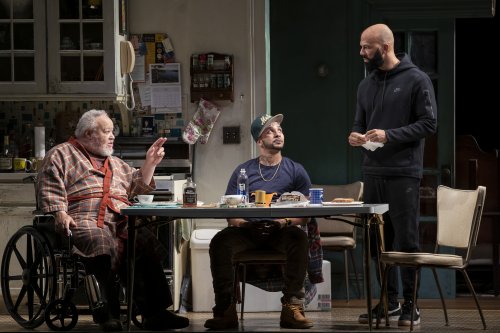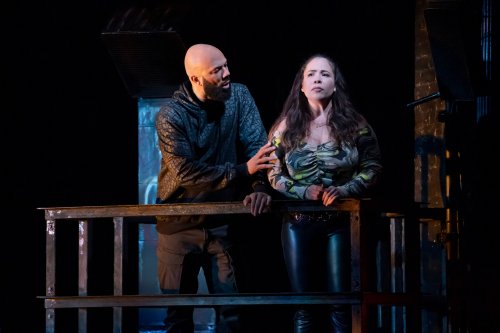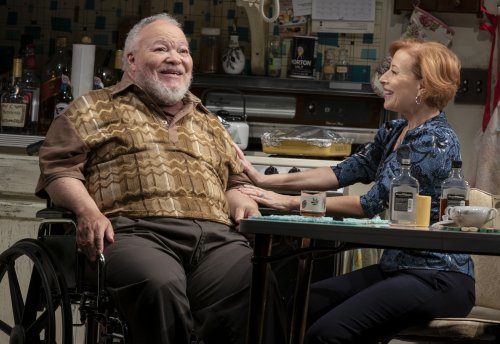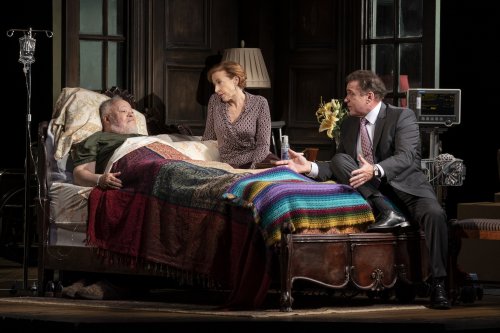Between Riverside and Crazy
If Stephen Adly Guirgis' Pulitzer-Prize-winning play were any better, it might have been great.

Stephen McKinley Henderson, Victor Almanzar and Common in a scene from Stephen Adly Guirgis’ “Between Riverside and Crazy” at The Helen Hayes Theater (Photo credit: Joan Marcus)
Living in his “palatial” rent-controlled apartment on one of Manhattan’s most stunning architectural stretches, Walter “Pops” Washington (Stephen McKinley Henderson) is an aging man of aging principles. A Black ex-cop, he presides over a crumbling kingdom from the figurative throne of his dead wife’s wheelchair in Stephen Adly Guirgis’ Pulitzer-Prize-winning Between Riverside and Crazy. The gruffly engaging Henderson, along with the rest of the heady ensemble, feast on Guirgis’ piquant dialogue that blends the sacred with the profane, the comic with the tragic, and earnest social commentary with intense silliness. It’s just unfortunate that Guirgis’ shaggily constructed plot inspires doubts about whether a brilliant cast and brilliant writing necessarily equate to a brilliant play.
Stuffed to its edges with a lifetime of Pops’ possessions, including a drooping, severely past-its-date Christmas tree, Walt Spangler’s turntable apartment set is a decent metaphor for much of what’s weighing Pops down; it’s also a fitting way to visualize Guirgis’ struggle to wrangle a whirligig of ideas into a coherent shape that dispenses exposition as effortlessly as philosophy. To varying degrees, all of the characters in the play–especially the putatively honorable ones–are hustlers, which Guirgis becomes himself to finagle Between Riverside and Crazy an emotionally satisfying ending that, like all good cons, goes unquestioned while it’s happening. It would have been better if Guirgis simply had opted for another rewrite or two.

Common and Rosal Colón in a scene from Stephen Adly Guirgis’ “Between Riverside and Crazy” at The Helen Hayes Theater (Photo credit: Joan Marcus)
Still, though he ultimately can’t tie all of his thoughts together, what Guirgis spins out is nevertheless often stunningly effective, particularly the relationships between Pops and two wayward houseguests, Oswaldo (Victor Almanzar) and Lulu (Rosal Colón. They share Pops’ mornings in a kitchen big enough to earn the envy of most New Yorkers, as the jarring sounds of the city (design by Ryan Rumery) undermine any chance for serenity. Both youthful layabouts are living for free in the apartment at the invitation of Pop’s son Junior (Common), a long-time criminal whose deep-seated resentments toward his law-and-order father sharply conflict with the almost reflexive respect others accord the old man. Oswaldo and Lulu, Junior’s girlfriend, even refer to Pops as “dad,” suggesting a genuine need for the type of paternal bond that the use of a trite nickname can’t provide.
But it’s also possible Oswaldo and Lulu are less interested in acquiring a father figure than in continuing to enjoy complimentary room-and-board. Like Junior, neither is a stranger to deception, or committing a felony, making it reasonable to wonder about their motivations for raptly listening to Pops’ rough-hewn wisdom as he consumes pie and whiskey for breakfast. In that sense, Guirgis’ play is like a Rorschach test for human behavior, where one can see Oswaldo and Lulu either admirably struggling to rise above their pasts or just sinking back into them. Or, maybe it’s something in between. Regardless, the affecting Almanzar and Colón keep us hoping for the best.

Stephen McKinley Henderson Elizabeth Canavan in a scene from Stephen Adly Guirgis’ “Between Riverside and Crazy” at The Helen Hayes Theater (Photo credit: Joan Marcus)
Making his Broadway debut, the multi-talented rapper Common holds his own against the rest of the cast, most impressively in scenes with Henderson as their characters’ tense relationship is expressed both vocally and viscerally. In fact, Junior’s entire existence appears to be almost a Brechtian protest against the hypocrisies of the one Pops has led, especially those related to his job and marriage. If there’s an issue with Common’s performance, the blame lies elsewhere, as he struggles to complete an emotional arc for Junior that Guirgis hasn’t written and director Austin Pendleton can’t figure out how to help him fake.
Junior’s character development loses out to the details of Pops’ stalled lawsuit against the city that stems from Pops being shot at an after-hours bar by a trigger-happy and apparently racist white cop. Despite financial necessity and a ticking clock, Pops’ pride won’t let him settle the case that cost him his career, even at the urging of his former partner, Detective O’Connor (Elizabeth Canavan), and her fiancé, the curiously insistent Lieutenant Caro (Gary Perez, replacing Michael Rispoli for the rest of the run), each of whom lets Pops know that his rent-controlled apartment and Junior’s freedom are both in jeopardy if he continues to hold out. It’s unclear why Pops lets this pair of obvious phonies into his home (maybe that’s the only kind of friends New Yorkers can make?), but, for shouldering much of the strained plot, Guirgis rewards Canavan and Perez with a few great spotlight moments, including Caro’s hilariously foulmouthed assessment of an erstwhile Republican mayor turned dodgy presidential lawyer.

Stephen McKinley Henderson, Elizabeth Canavan and Michael Rispoli in a scene from Stephen Adly Guirgis’ “Between Riverside and Crazy” at The Helen Hayes Theater (Photo credit: Joan Marcus)
But it’s the introduction of a character in the second act, the enigmatic Church Lady (Maria-Christina Oliveras), who epiphanically propels Between Riverside and Crazy towards its forced conclusion. After too-knowingly and too-neatly summarizing Pops’ fraught personal relationships, she essentially turns herself into a deus ex machina, rousing Pops’, let’s say, spirit, in a truly miraculous way. It’s an extraordinarily well-acted scene that Henderson and Oliveras build to a near show-stopping climax, but it also makes the play much more entertaining than believable. While that’s not undeniably bad, on second thought, it is a little disappointing.
Between Riverside and Crazy (through February 19, 2023)
Atlantic Theater Company Production
Second Stage Theater
The Helen Hayes Theater, 240 West 44th Street, in Manhattan
For tickets, call 212-541-4516 or visit http://www.2st.com
Running time: two hours and 20 minutes including one intermission






Leave a comment